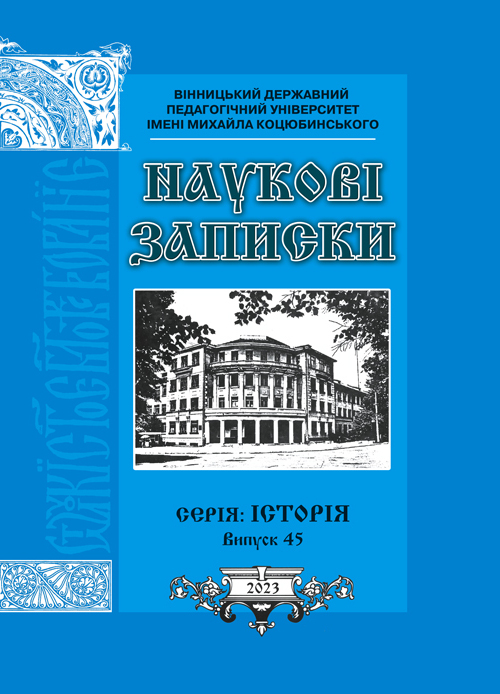Abstract
The purpose of the study is to reveal the peculiarities of the use of periodicals by the communist authorities as instruments of total mobilization of Western Ukrainian society in the first postwar decade, to investigate the specifics of their activities in the context of the region's Sovietization. Research methodology. The methodological approach of the study is based on the theory of a totalitarian state devoid of democratic principles. General scientific methods of analysis and synthesis, comparison and generalization are also used. Historical methods of external and internal criticism of archival sources are applied. The scientific novelty is that for the first time the peculiarities of the functioning of printed periodicals in the regional context are considered, and the ways in which they were used by the authorities as an instrument of social mobilization of Western Ukrainian society in the period of late Stalinism are shown. Conclusions. It is concluded that the press of the western regions of Ukraine was one of the most important instruments of Sovietization of the region during the first postwar decade. All regional newspapers, without exception, were the publications of the district/city/regional committees of the CP(b)U. Editorial policy a priori could not be independent, since under the conditions of the party monopoly on the information space, the entire press was under the total control of the Bolshevik Party. The printed periodicals of the period under study served as agitators and propagandists of Stalin's ideas and the policies of the ruling Communist Party. On the one hand, they helped mobilize the population to rebuild the region's economy, and on the other hand, they supported the party's policy aimed at fighting the Ukrainian insurgency. The widespread practice of engaging local residents as newspaper correspondents, the «robsilker», was aimed at creating the illusion of popular support for the Party-Soviet government and the possibility for every "ordinary citizen" to freely join the process of state building.
References
Kononenko, V., Melnychuk, O. (2019). The role of the soviet press in cultural-ideological processes in the Ukrainian SSR (1945 – 1953). Східноєвропейський історичний вісник, 11, 169–179. https://doi.org/10.24919/2519-058x.11.170711
Popp, R. (2018). Ideological-propaganda policy of the soviet system in the western region of Ukraine in 1944 – 1953 (according to the materials of Drohobych region). Східноєвропейський історичний вісник, 8, 142–152 https://doi.org/10.24919/2519-058x.8.143357
Starodubets, G., Popp, R. (2020). The policy of Sovietization of the western rgions of Ukraine in 1944–1953 through the Propagandist symbols and rituals. Studia Historica Nitriensia, 24, 2, 412–427. https://doi.org/10.17846/SHN.2020.24.2.412-426
Starodubets, G., Sokoliuk, S. (2022). Propaganda Component of the Process of Sovietization and Forms of its Implementation in the Western Regions of Ukraine in 1944 – 1950. Studia Historica Nitriensia. 26, 2, 408-421. https://doi.org/10.17846/SHN.2022.26.2.408-421
Бортніков, В. (2020). Газета «Радянська Волинь» як джерело сталінської пропаганди. Тоталітаризм як система знищення національної пам’яті: збірник наукових праць за матеріалами всеукраїнської науково-практичної конференції з міжнародною участю 11–12 червня 2020 року. Львів, 23–27.
ДАТО - Державний архів Тернопільської області.
Каліщук, О (2021). Повсякдення волинян у повоєнні роки: окремі аспекти ідеологічного тиску (за матеріалами газети «Радянська Волинь». Повсякденне життя населення західних земель України у перші повоєнні роки (1944–1953) : колективна монографія / відп. ред. В. Ільницький. Львів – Торунь : Liha-Pres, 297-317.
Кравчук, Л. (2016). Преса як засіб радянізації Тернопільщини (вересень 1939 – червень 1941 рр.). Наукові записки Тернопільського національного педагогічного університету імені Володимира Гнатюка. Серія : Історія. 2(3), 70-72.
Кравчук, М. (2004). Утвердження тоталітарної політичної системи засобами політичної пропаганди (радянський період). Науковий вісник Чернівецького університету. Історія. Політичні науки. Міжнародні відносини : Зб. наук. праць, 229-230, 129-133.
Крупський, І. (2020). Партійне керівництво ЗМІ як різновид ідеологічної цензури (на прикладі західноукраїнських земель повоєнних років). Тоталітаризм як система знищення національної пам’яті: збірник наукових праць за матеріалами всеукраїнської науково-практичної конференції з міжнародною участю 11–12 червня 2020 року. Львів, 37–41.
Нагірняк, М. Лаврецький, В (2013). Політична та ідеологічна боротьба органів Комуністичної партії у процесі утвердження режиму в Західній Україні (1944–1945 рр.). Військово-науковий вісник. 20, 66-80.
Наслідуйте мій приклад (1946). Нове Життя. 16 жовтня.
Нове Життя (1947). 26 січня.
Палюх, О. (2010). Газета «Вільна Україна» (1939–1941 рр.) як видавничий проект. Збірник праць Науково-дослідного центру періодики; НАН України, ЛННБУ ім. В. Стефаника, НДІ пресознавства. Львів, 2, 70.
Почепцов, Г. (2015) Пропагандистские системы Германии и СССР: параллели и различия. https://argumentua.com/stati/propagandistskie-sistemy-germanii-i-sssr-paralleli-i-razlichiya
Філіпова, О. (2013) Дискурс партійно-радянської повоєнної преси Півдня та Заходу України: порівняльний аспект. Збірник праць Науково-дослідного інститу пресознавства, 3, 462-476.
Хруляк, Ф. (1947). Від щирого серця дякую рідному Сталіну. Нове Життя. 8 березня.

This work is licensed under a Creative Commons Attribution 4.0 International License.
Copyright (c) 2023 Галина Стародубець





